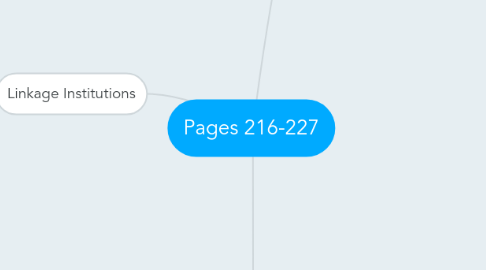
1. Linkage Institutions
1.1. Groups that link citizens to the government are still not strong in Russia
1.2. Parties
1.2.1. Most established democracies have had many years to develop their party systems. Russia put theirs together shortly after the Revolution of 1991
1.2.2. Party amount has decreased over the years, starting at 43 parties. Now, there are only 5 main parties
1.2.3. United Russia
1.2.3.1. Founded in April of 2001 as a merger of Fatherland All-Russia Party and the Unity Party of Russia
1.2.3.2. The merge helped give more support to Vladimir Putin
1.2.3.3. Strongest Party (President and 221 of the 450 Duma Seats in 2003, 315 in 2007)
1.2.3.4. Hard to define except that it is pro-Putin
1.2.4. The Communist Party of the Russian Federation
1.2.4.1. The Communist Party that survived the Soviet Collapse
1.2.4.2. Second Strongest party in Russia
1.2.4.3. The party's support has dropped in recent years (57 Duma seats in 2007)
1.2.4.4. Led by Gennady Zyuganov
1.2.4.5. Not exactly like the old Communist Party, but it is far less reformist
1.2.4.6. Emphasizes centralized planning and nationalism and implies an intention to regain lost Soviet territories
1.2.5. Liberal Democrats
1.2.5.1. By far the most controversial party
1.2.5.2. Led by Vladimir Zhirinovsky, who is known around the world for his extreme nationalist positions
1.2.5.3. Implied that under this party's leadership, Russia would use nuclear weapons on Japan, and Anti-Semitic remarks are commonly said by Zhirinovsky
1.2.5.4. The party's influence has gained in recent years, obtaining 40 seats in the Duma in 2007
1.2.6. A Just Russia
1.2.6.1. Formed in 2006 by a merger of the Motherland People's Patriotic Union with the Party of Pensioners and the Party of Life
1.2.6.2. Led by Sergei Mironov, the Speaker of the Federation Council
1.2.6.3. A Just Russia gained 38 seats in the 2007 Duma elections
1.2.7. Patriots of Russia
1.2.7.1. Gained 8% of the vote in 2011, despite being a party that few had heard of
1.2.7.2. Analysts say that it is a Kremlin product, tested to be deployed in the Parliamentary election in December of 2011
1.2.7.3. Describes itself as a party of "statists" and "patriots" that aims to build a "great and prosperous" Russia
1.2.7.4. Others say that it is simply a tool to foil the Communist Party and Just Russia
1.2.8. Ideological Parties have been replaced by parties of power, or parties sponsored by political and economic power-holders. United Russia is an example of this, as it is Putin's party and was created by powerful oligarchs
2. Elections
2.1. Referendum
2.1.1. The Constitution of 1993 allowed the president to call for national referendum by popular vote on important issues.
2.1.2. Boris Yeltsin called for a referendum on his job performance before it was written formally.
2.1.3. The people supported his reforms, but no majorities were overwhelming.
2.1.4. Second referendum was held later that year, and the people voted in favor of the new Constitution.
2.1.5. Regional referendum was held in Chechnya in 2003 to approve a constitution for the area. The constitution was approved, including the phrase that declared Chechnya to be an "inseparable part" of Russia.
2.2. Duma Elections
2.2.1. Russian citizens have gone to the polls five times to elect Duma representatives.
2.2.2. The Duma has 450 seats, and until 2007, half were elected by proportional representation, and the other half by single-members districts.
2.2.3. As of 2007 "Againist all" was eliminated as an option for voters to reject candidates.
2.2.4. Parties must get at least 7% of the total vote to get any seats according to proportional representation. This was initiated by Putin.
2.2.5. Since 1993 parties have merged and disappeared, so that only a few have survived to the present.
2.3. Presidential Elections
2.3.1. They follow the 2 round model that the Duma has.
2.3.2. In 2000 Putin received 52.94% of the vote, so no run-off election was required, since he captured a majority on the first round.
2.3.3. Some observers have questioned the honesty of elections, particularly since the media obviously promoted Yeltsin in 1996 and Putin in 2000.
2.3.4. A 2001 law seriously restricted the right of small, regional parties to run presidential candidates, so critics questioned how democratic future presidential elections might be.
2.3.5. Putin hand-picked his successor, Dmitirti Medvedv.
3. Interest Groups
3.1. The Oligarchy
3.1.1. The Oligarchy gained significant power, especially during Yeltsin's last year in office.
3.1.2. Berezovsky: Most well-known oligarch. He utilized the media to insure Yeltsin's reelection. He resigned in 2000, and created the Unity Party, which caused Putin's election.
3.1.3. Putin showed resistance to the oligarchs: Gusinsky criticized Putin, and was arrested. Khodorvsky was also arrested at Putin's command.
3.1.4. After the arrests,the oligarchs largely withdrew from politics.
3.2. State Corporatism
3.2.1. State Corporatism: The state determines which groups have input into policymaking.
3.2.2. Companies are allowed free reign, but upon becoming too independent, the government cites legal infraction to force sales.
3.2.3. AKA Insider privatization
3.3. The Russian Mafia
3.3.1. A larger influence than the oligarchs (at times)
3.3.2. Gained power after the Revolution of 1991, and control many businesses. They receive payoffs from businesses and deals with politicians.
3.4. The Russian Media
3.4.1. Pravda: The official Soviet Union newspaper: Only printed what government officials told it to, making it an important tool for propaganda. Under Putin, Pravda became a tabloid with a huge audience.
3.4.2. Some Russian television stations are privately owned, but most are controlled by the state. NTV, for example, was taken over by the Kremlin. The journalists switched to the channel TV-6, which was closed down. Several journalists were later found dead.
3.4.3. State corporatism also affects the media. RUJ was evicted to make room for Russia Today (used to promote a positive image of Russia abroad).
3.4.4. Several reporters who have criticized the government have ended up dead.

